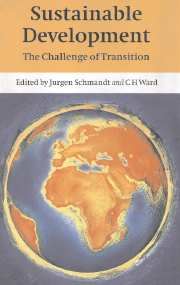Book contents
- Frontmatter
- Contents
- List of contributors
- Foreword
- Preface
- 1 Challenge and response
- 2 National self-interest in the pursuit of sustainable development
- 3 Uneconomic growth: Empty-world versus full-world economics
- 4 Population and consumption: From more to enough
- 5 Spirituality and sustainability
- 6 Leadership skills for sustainable development
- 7 The role of science: Guidance and service
- 8 Economic tools, international trade, and the role of business
- 9 Stakeholders and sustainable development
- 10 From idea to action: The role of policy
- Index
5 - Spirituality and sustainability
Published online by Cambridge University Press: 17 August 2009
- Frontmatter
- Contents
- List of contributors
- Foreword
- Preface
- 1 Challenge and response
- 2 National self-interest in the pursuit of sustainable development
- 3 Uneconomic growth: Empty-world versus full-world economics
- 4 Population and consumption: From more to enough
- 5 Spirituality and sustainability
- 6 Leadership skills for sustainable development
- 7 The role of science: Guidance and service
- 8 Economic tools, international trade, and the role of business
- 9 Stakeholders and sustainable development
- 10 From idea to action: The role of policy
- Index
Summary
On all sides, the future and purpose of our industrial society is being called into question. This comes somewhat as a surprise. Not so many years ago, we were told that we had never had it so good, and that in time, things would be even better, as we – the developed nations – with the “underdeveloped nations” in tow, would march into the Age of Plenty. Modern science and technology had done it; Western civilization had done it.
It was a good dream.
I came of age in the 1960s. I came into a sense of self and world and future in those years, the defining moment of which, for me, was the day the men landed on the moon.
I was at summer camp. We were sitting on the floor of a lean-to at Pioneer Village, into which a black and white TV had been wired, then rolled into the hall for the special occasion, and sitting in our T-shirts and shorts, 150 eager campers stared, moonstruck, up at the screen. What a sense of collective triumph and pride and optimism, and – invincibility. I came of age also as the daughter of an immigrant from Eastern Europe, who landed in New York City circa 1945. And so I came up knowing something about the promise of the American Dream, and the hopes it unwaveringly carried for its children. By so many, it was intended as, and assumed to be – a good dream.
- Type
- Chapter
- Information
- Sustainable DevelopmentThe Challenge of Transition, pp. 101 - 112Publisher: Cambridge University PressPrint publication year: 2000



